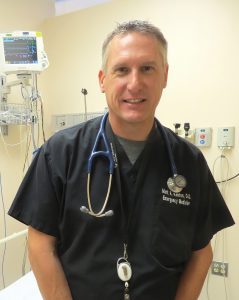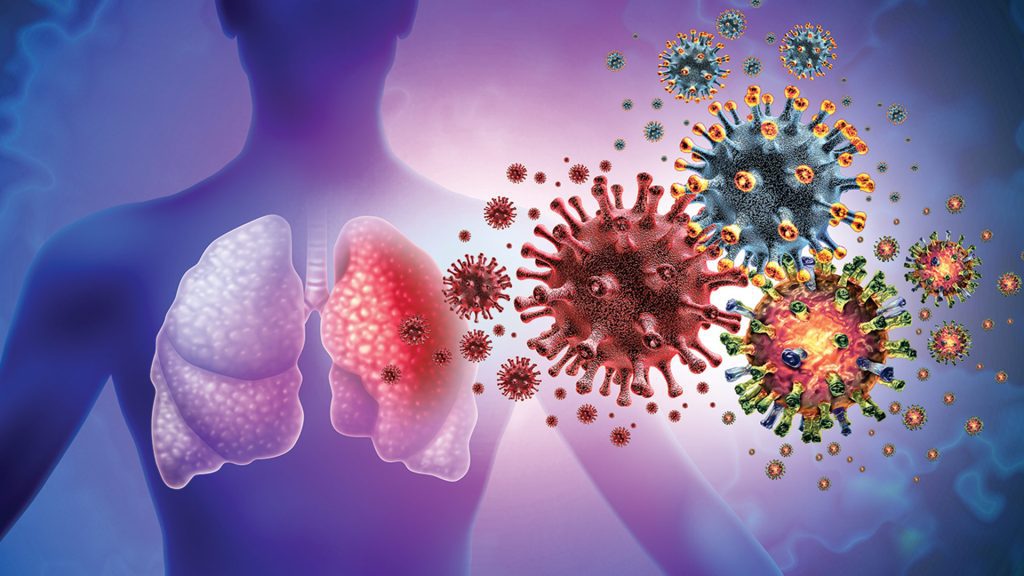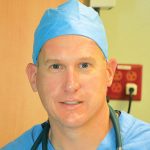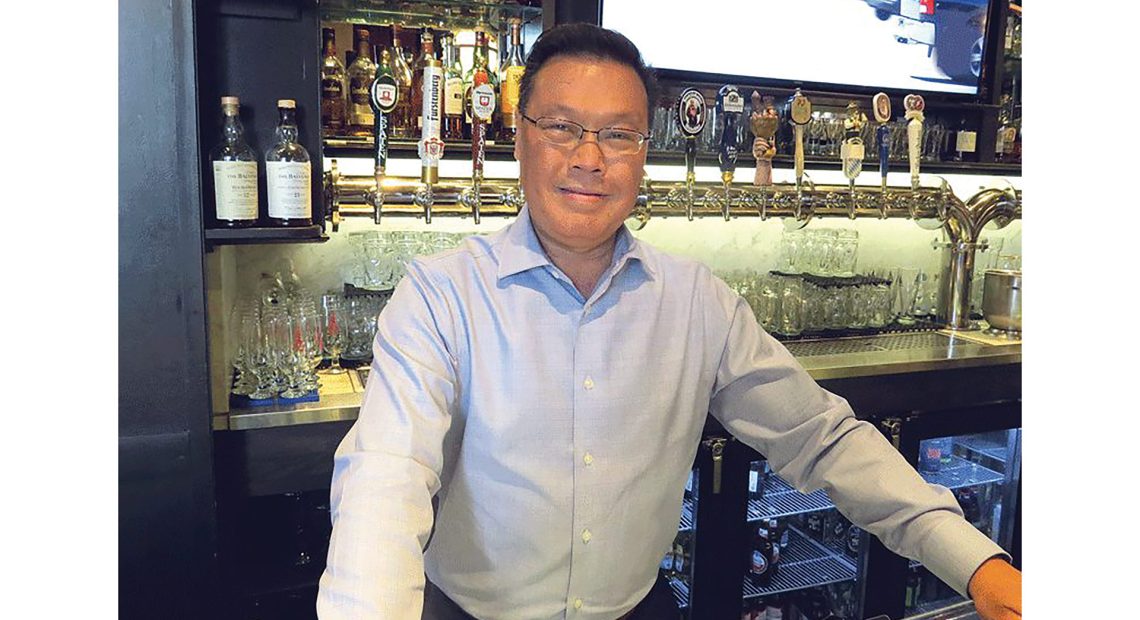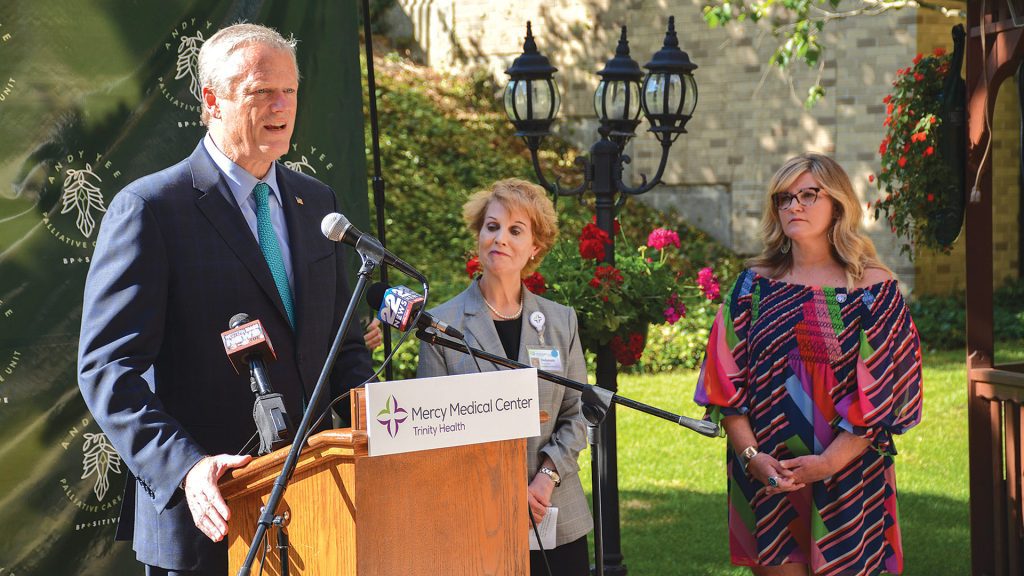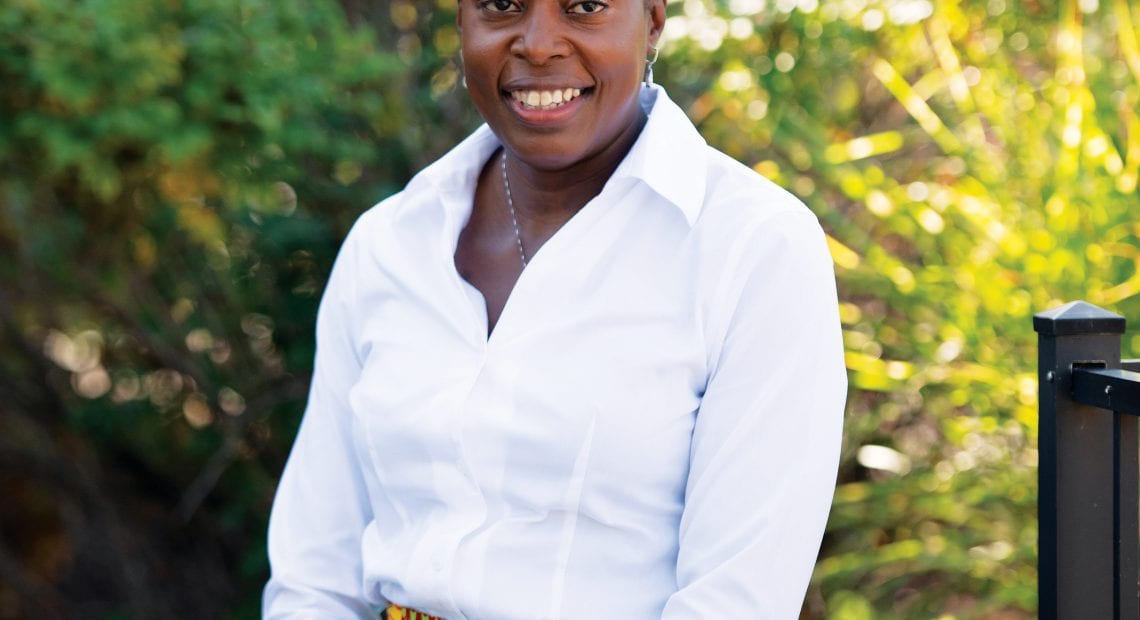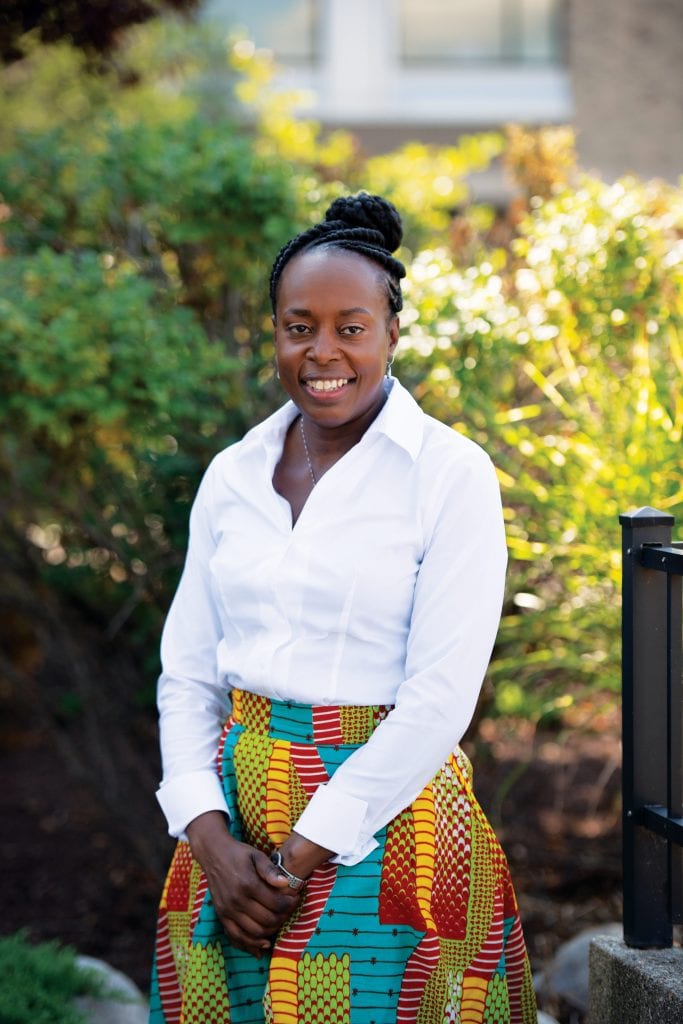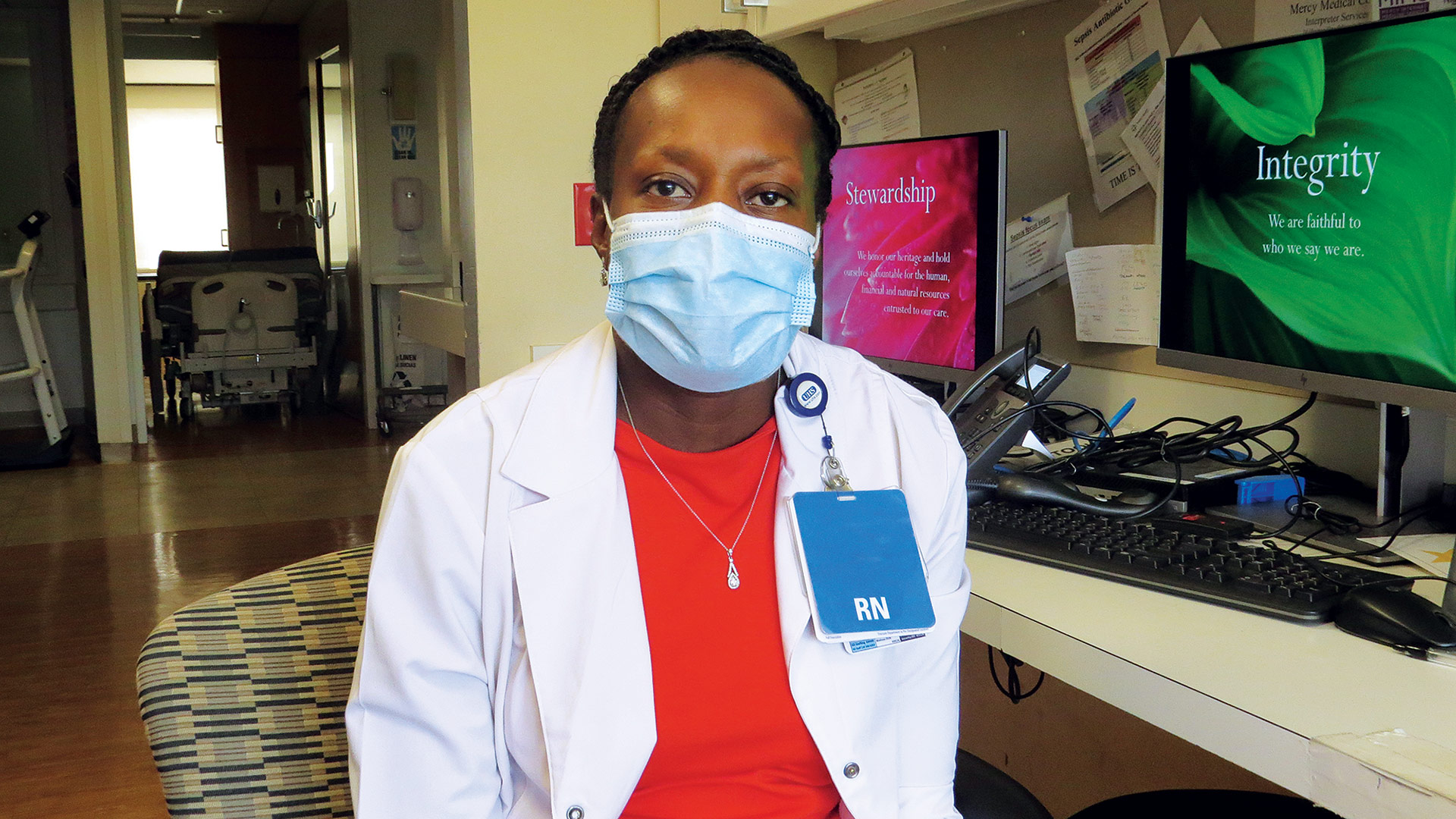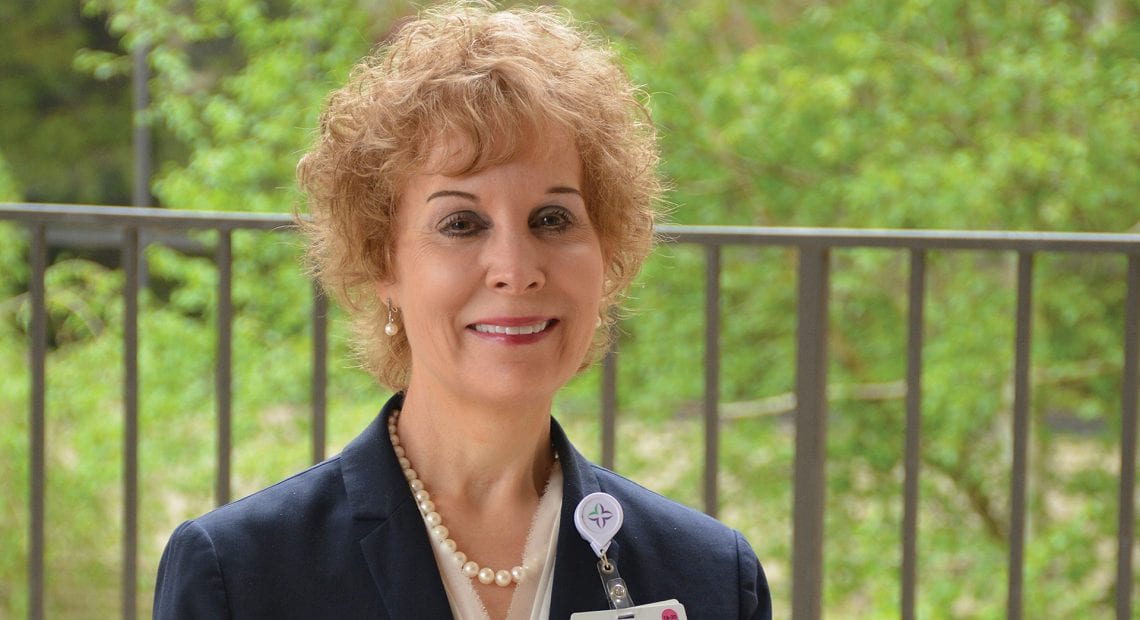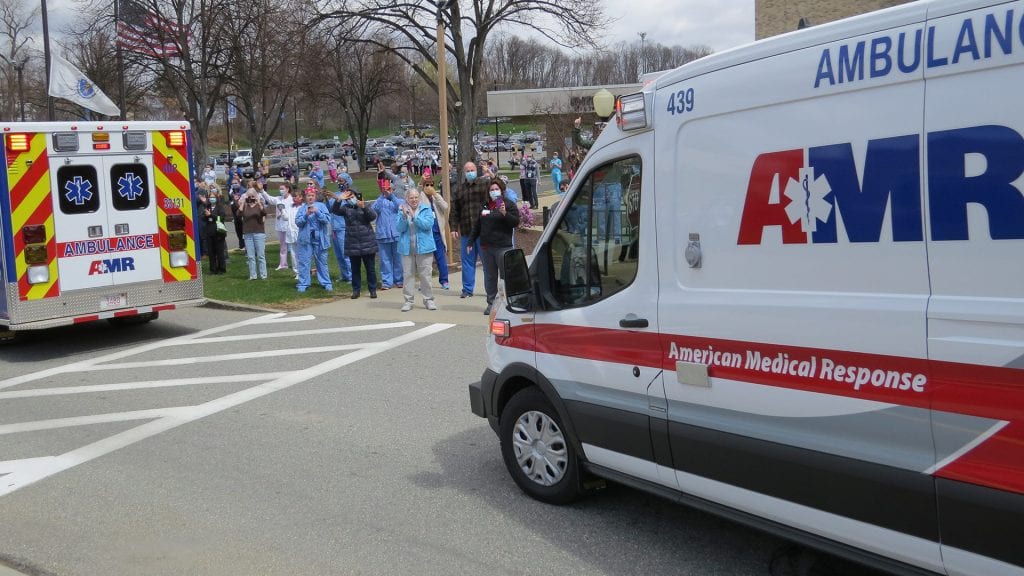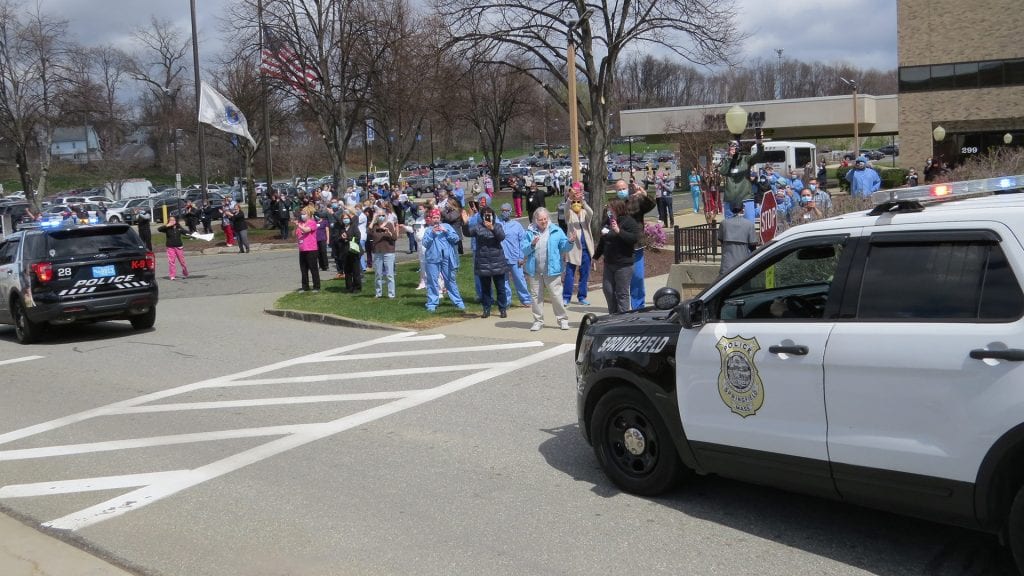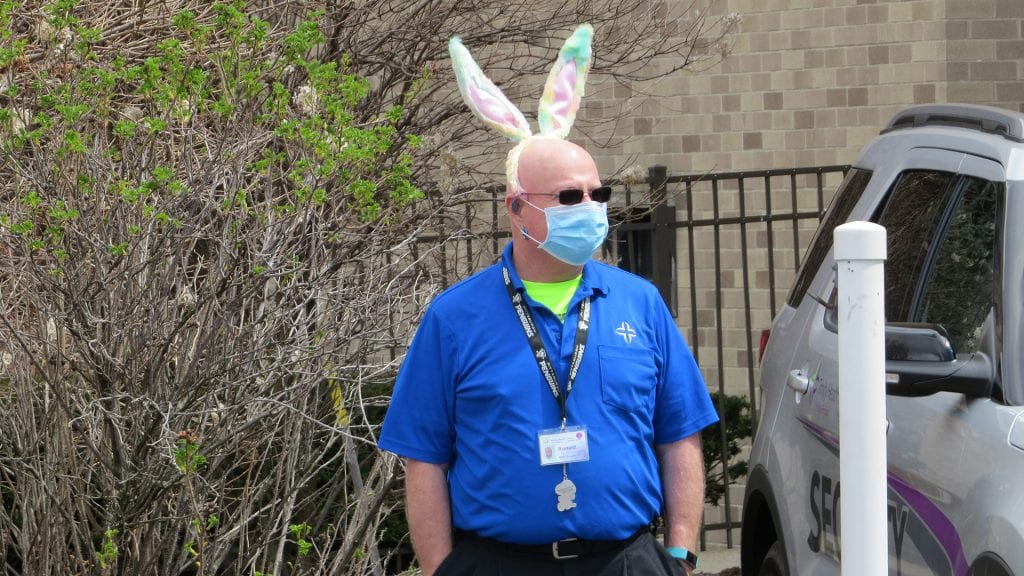Into the Breach
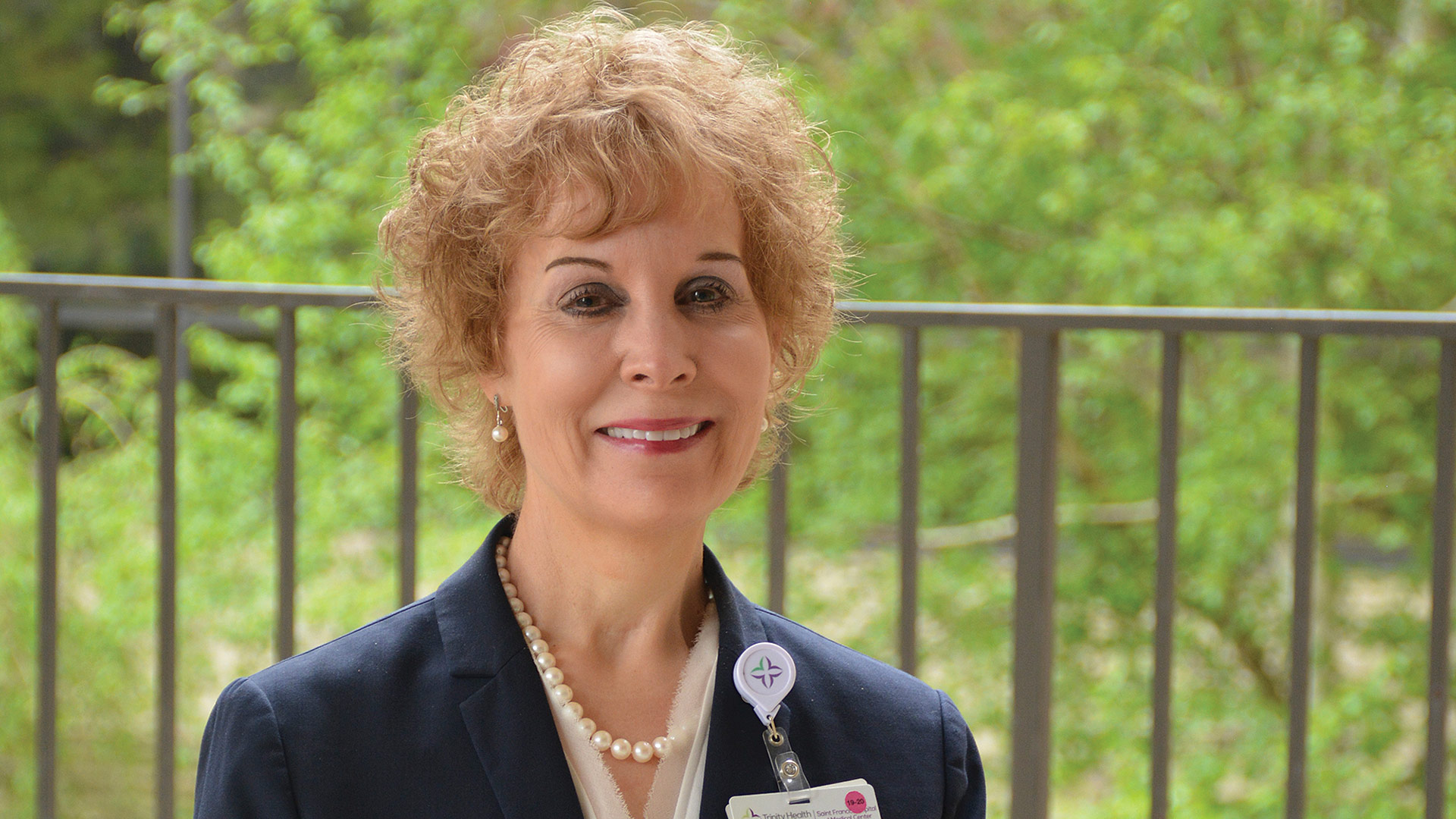
Debbie Bitsoli says her learning curve has been altered by COVID-19, but she’s made the most of the opportunity.
Debbie Bitsoli understood she was taking on a huge challenge when she accepted the role of president and CEO of Mercy Medical Center and its affiliates late last fall.
But she certainly wasn’t expecting anything quite like this.
Indeed, the first six months of her tenure have been dominated not only by a global pandemic that has tested hospitals, and especially smaller community hospitals, in every way imaginable, but also a painful and controversial decision to close inpatient beds at Providence Behavioral Hospital, one of Mercy’s affiliates (more on that later).
Overall, it has been a pressure-packed, greatly accelerated learning experience on innumerable levels, one that has left her knowing more about herself, and also about Mercy and its team; Trinity Health Of New England, the parent to Mercy Medical Center; and the community the hospital serves.
“This has given me the opportunity to learn more about the culture here at Mercy and its history,” she noted. “It’s allowed me to cherish that history more as I’ve understood it, and all the years the hospital has stood on these grounds. It’s been a different type of learning experience because I’ve had to do a lot of it virtually, but I’ve made the most of it.”
The pandemic arrived in this region just a few months after Bitsoli did, and, as noted, it has impacted the hospital and its staff on a number of levels — everything from combating shortages of personal protective equipment to the strain of treating those with the virus, to the financial trauma resulting from the inability to perform elective surgery and a sharp decline in emergency-room visits due to the public’s fear of contracting the virus.
“This has given me the opportunity to learn more about the culture here at Mercy and its history.”
All hospital administrators have been facing the same potent mix of challenges, but for Bitsoli, who came to Mercy from Morton Hospital in Taunton in early December, the pandemic has greatly accelerated but also profoundly changed the process of putting her stamp on the 147-year-old institution.
And it has left her calling on experience — and experiences — going all the way back to when she worked in the dietary department at a hospital, delivering meals to patients — a job her mother, an emergency room nurse, helped her land.
“My mother set an extremely high bar,” Bitsoli told BusinessWest. “And when she got me my first job, she said two things to me — first, ‘when you bring that tray in to that patient, you’re to think about the person in front of you, not yourself.’ And, second, ‘don’t embarrass me.’ I don’t think I ever have.
“The 12 years I spent on the front lines — in dietary, housekeeping, and ultimately in the intensive care unit by the bedside with the nurses — really helped to prepare for what it’s like in direct clinical care,” she went on. “It has provided me the empathy, respect, and admiration for the front-end work that all the caregivers — the nurses, the doctors, and all the medical staff and colleagues — contribute. I had that as background, which I think equips me very well for the future.”
While the first six months of her tenure have been difficult, Bitsoli said there have been some silver linings, if one chooses to call them that. She said the pandemic has enabled her to work with her team and her board on a level — and under circumstances — that could not have been anticipated when she arrived. Meanwhile, the crisis has enabled her to see first-hand — and in many different ways — the importance of Mercy within the community and the strong level of support the institution enjoys.
“The outpouring from the community, and the love, respect, and admiration that they feel for Mercy Medical Center, has been … I can’t describe in words how much it resonates for me and how much it means for the front-end staff,” she said. “All those contributions we received, and the prayers, respect, and recognition, have meant the world to people here and allowed them to move forward knowing they’re contributing significantly.”
For this issue, BusinessWest talked at length with Bitsoli about her brief but already memorable tenure at Mercy, and how this stern challenge has tested her and the medical center — and will keep doing so for months, if not years, to come.
Background — Check
Bitsoli brings a deep portfolio of experience in healthcare management to her role at Mercy — and the current crisis — with all of it coming in the Bay State.
As noted earlier, she came to the Springfield campus after a four-year stint as president of the 110-bed Morton Hospital. Prior to that, she served as chief operating officer and vice president of Saint Vincent Hospital in Worcester, a position she took after serving for three years as COO of MetroWest Medical Center in Framingham. Previously, she served as associate COO, chief administrative officer, and chief financial officer at Cambridge Health Alliance; administrator of Internal Medicine at Harvard Vanguard Medical Associates; and audit manager and project manager at Harvard Pilgrim Health Care.
She said she was drawn to the leadership post at Mercy by a number of factors, including the hospital’s somewhat unique mission as a Catholic hospital, its strong reputation for quality and caring, and its status as part of the larger Trinity Health Of New England system.
She took over a hospital that reported a $12.6 million loss for the 2018 fiscal year and had made a number of staff reductions and other cutbacks in the months prior to her arrival.
“The 12 years I spent on the front lines — in dietary, housekeeping, and ultimately in the intensive care unit by the bedside with the nurses — really helped to prepare for what it’s like in direct clinical care.”
But such challenges were common to most all smaller hospitals in Massachusetts and New England, and Bitsoli said this was part of the landscape when it comes to hospital administration in this era. And so was dealing with crises, she said, adding that she’s helped lead institutions through recessions, the fallout from 9/11, and even other epidemics, such as SARS.
But this pandemic? That’s another story, and it has changed that landscape quickly and profoundly. Indeed, in addition to treating those with the virus and safeguarding staff and the community from it, Mercy, like all hospitals, has been hit hard by the inability to perform elective surgeries and sharply declining revenues from declining visitation in the ER — conditions that have forced hospitals to trim staff and implement pay cuts, even to doctors.
To guide the hospital through the crisis and its many impact points, Bitsoli said she and the management team have been focused on three things — planning, preparing, and anticipating — to the extent that they are all possible with this fast-moving pandemic.
“We have twice-daily meetings with the executive team seven days a week, so we can plan and adjust accordingly based on what’s occurring,” she noted, adding that, in recent weeks, patient volumes related to COVID-19 have declined. “The key for me was planning, preparing, and anticipating as this unfolded so that we could make sure we had our structures and designs in place to keep our patients safe.”
Meanwhile, the decision to close the 74 inpatient beds — the pediatric, geriatric, and adult units — at Providence has brought its own set of challenges. Deemed necessary because of a lack of permanent psychiatrists, the planned closure of the units, with the intention of patients seeking care at other Trinity Health facilities in Connecticut, has been criticized not only for the level of inconvenience it imposes on area residents, but also for its timing.
Indeed, the pandemic has generated a sharp rise in the need for behavioral-health services as residents cope with everything from isolation-related issues to depression and other conditions related to job loss and financial pressures, promoting even greater need for beds at Providence.
But Bitsoli said that, for several reasons, and especially the lack of psychiatrists, the hospital cannot continue to operate those beds.
“It’s been a difficult but necessary decision in light of the fact that you need physicians to take care of the patients,” she explained, adding that the services are slated to be discontinued on June 30, although the state Department of Public Health has asked for a more detailed plan on how and where people can get help before it can approve the closure plan.
Vision Statement
When asked specifically about what is involved with leading a hospital through a crisis like the COVID-19 pandemic and difficult transitions like that at Providence, Bitsoli paused for a moment as if to convey that there is a lot that goes into that equation.
She mentioned everything from leading by example, something she strives to do every day, to communicating effectively with constituents ranging from patients and staff to the community to state and federal lawmakers about the many forms of help hospitals will need to weather this storm.
When Bistosli, a CPA, was working toward her MBA at Babson College in Wellesley, she did a considerable amount of reading on the subject of leadership, and is putting what she learned from that time — as well as at all the other stops on her résumé — into practice now.
“I read historical books about great leaders like George Washington and Abraham Lincoln, and I think that’s the learning there,” she noted. “One key element of leadership for me is trust and really making sure that the people who are on the direct team know that my vision for leadership is that we’re all in a boat together and we’re all united in that boat moving downstream, with the goal of looking at our workday to provide the maximum impact to patient safety and the colleagues we work with and for.
“For me, leadership is about trust and the ability to have a relationship with people to allow them to do the best work possible,” she went on. “To learn, to adapt, and to sometimes make mistakes, which is OK, because you learn from them. At the end of the day, you mature as a business owner and as a professional, and to me, that’s what leadership is all about.”
She said another key element to providing effective leadership — during a pandemic or any other time — is to inspire team members to reach a level they may have thought was beyond their reach, and then give them the support and the tools needed to get there.
“I want people to really aspire to greatness because, through my career, I’ve seen great, great people who didn’t know that they could get there, but with a little prodding and trust and a comfort zone, they’re able to rise above what they thought they were capable of,” she told BusinessWest. “They got there through a little support, mentorship, and really nudging — and that’s a the sign of a great leader; you invest in people, you mentor people, and you prod them because you know they can get to another level of performance.”
Moving forward during this pandemic, Bitsoli said Mercy, and all hospitals, for that matter, are summoning the same two-word phrase being used by every other business sector to describe the present and the near future: ‘new normal.’
Indeed, as COVID-19 cases decline — Mercy recently closed two of its COVID units — and the state slowly begins the process of reopening the economy, hospitals are, like all other businesses, looking to get back to what was normal.
But that won’t happen for some time, she said, adding that there are several factors that will determine when and if that state can be reached, including everything from possible new surges of the virus to the public’s appetite for returning to places like emergency rooms and doctor’s offices and fully addressing their health issues.
And, again, as at other businesses, the day to-day will certainly be different in this new normal.
“For Mercy and all the other hospitals nationally, there is going to have to be more state and federal funding allotted,” she said, referring to the fiscal challenges created by the pandemic. “It’s going to take a long time for hospitals to be able to open their doors as they did six months ago or even four months; it’s going to be a while.”
Elaborating, she said that so much depends on both the state’s reopening strategy and the ability of individual hospitals to convince the public it is safe to seek care at such institutions. The plan, released on May 18, allows hospitals that can meet specific capacity criteria and public-health and safety standards to resume a limited set of in-person services. These include high-priority preventive services, including pediatric care, immunizations, and chronic-disease care for high-risk patients, and urgent procedures that cannot be delivered remotely and would lead to high risk or significant worsening of the patient’s condition if deferred.
“Hospitals have to demonstrate to the public that they have sufficient areas that are COVID-free, which Mercy does,” she noted, “and demonstrate to the public through word of mouth that people are coming back, they’re seeing the signage, they’re seeing the care, they’re seeing that we’re going to great lengths to ensure that the public is safe and we’re screening at the door, handing out masks, and taking temperatures.
“It’s going to take the public seeing that continued structure in place to demonstrate that acute-care hospitals are safe for them to come back to,” she went on, adding that it’s difficult at this time to say when that day will come.
She said she couldn’t properly quantify the economic impact at this point, noting that April’s numbers are still being analyzed. What she does know, though, is that all hospitals are in the same boat, and that Mercy is fortunate to be part of the larger Trinity system. “The hospitals that are in the smaller systems that don’t have the leverage and the scale — they’re in a different bucket than a hospital that is based with a system nationally.”
Bottom Line
When asked when things might start to get better for hospitals, Bitsoli said matters are complicated by uncertainty about when elective surgeries may begin again and how a second wave of COVID-19 cases might impact that equation.
“There are criteria being established at the state level for when people can start to do more elective surgeries, and the key driver to that is your intensive-care unit and your number of staffed beds,” she explained. “As we look at the data, we do expect that there will be a second wave, so as they’re discussing opening up the doors to hospitals for elective surgeries, they are factoring in that second wave, which they think will be in the fall.
“Once the state establishes the criteria and we can start to do more procedures based on Governor Baker’s recommendations, we’re going to have a better sense of what the future projections are going to look like,” she went on.
At this time, it’s difficult to make projections about the future because there are simply too many unknowns. For Bitsoli, the plan is to continue planning, preparing, and anticipating, and to lead by example as Mercy confronts novel challenges on an unprecedented scale.
She has several decades of experience to call on, right down to the words of advice her mother gave her about how to focus on the patient when she was bringing in that tray of food.
And, like her mother, she sets a high bar, one that will be needed during this time of challenge and the ongoing work of meeting it head on.
George O’Brien can be reached at [email protected]

